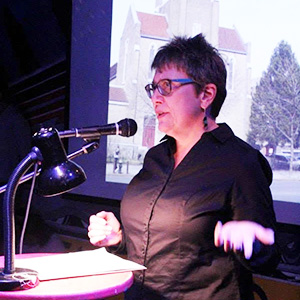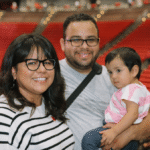
Karen Malfara
Karen Malfara is a writer and adjunct English instructor at San Diego City College. She’s also an enthusiastic fan of the Osher Lifelong Learning Institute at San Diego State University, where she took her first class in the spring of 2013 — Memoir Writing, taught by Kathi Diamant.
Malfara has since completed her memoir, Digging Up Bones: An Excavation of Memories, and entered an excerpt in the first annual San Diego Memoir Writers’ Showcase. Her entry was one of the 10 winning works, all of which were brought to life by professional actors on the stage of the beautiful Horton Grand Theater downtown, on June 30. Cheering her on the audience were several fellow writers — and now close friends — from Diamant’s class.
We trace Malfara’s journey to that special night.
Give us a brief history of your education and career.
Pursuing my education was a challenge. Although I set my sights on a Ph.D. when I was in kindergarten, I managed to get derailed many times. I moved from New York to San Diego several decades ago, in part, to pursue an affordable college education, but I didn’t actually obtain my degrees for quite some time. I was busy raising two daughters, most of the time as a single mom, but I finally obtained my associate degree in psychology at Mesa College in 2001. My oldest daughter and I both obtained our bachelor’s degrees at SDSU in May 2006 (mine was in English), and I completed my master’s in English literature in May 2010. I’m currently considering applying to an MFA program in creative writing.
I have worked many different jobs … in banking for almost 10 years … and for the County of San Diego for about 20 years. I started out as a clerk, worked my way up to an analyst position … and served as a grants coordinator until I left in 2010 to accept three teaching internship opportunities, two with SDSU and one with the community colleges (SDICCCA).
When and how did you llearn about the Osher Institute?
I’m an SDSU alumni. Perhaps that’s why I was on Osher’s mailing list. About a year and a half ago, I received the catalog and flipped through the listed courses. I noticed the memoir class and marveled at the reasonable cost. It was too good to pass up. The timing was perfect because that semester I had been offered only one class to teach. I had already planned to use the extra time to take a few writing classes and work on my memoir.
How would you summarize your experience in Kathi Diamant’s Memoir Writing course?
At that point, I had just completed another memoir writing course with Tom Larson through San Diego Writers, Ink. As I began Kathi’s class, I immediately realized the value of taking writing courses with multiple instructors. Each emphasizes different aspects of the writing process. Each brings his or her own special gifts to the experience. Kathi is a wonderful instructor; I got a lot out of her class. I also made some delightful connections and formed lasting bonds with other writers in the class.
Had you attempted to tackle a memoir prior to Diamant’s class?
Yes. I took the first baby steps, as a college student, in a creative nonfiction writing class at SDSU, but my early attempts I would now say were pretty awful. I still had so much to learn. I got some of the bones down on the page, but I still had a lot of growing to do as a writer. That much-needed growth and development began when I took Tom Larson’s memoir class at San Diego Writers, Ink shortly before Kathi’s course, and then Kathi’s class, along with others, added — and continue to add — new layers to my understanding of the writing craft.
What period of your life does your memoir cover?
It’s grounded in recent years and framed by my experience, as an adult, confronting my mother’s death and making all the necessary arrangements that come with the passing of a parent. This included creating a meaningful ceremony and scattering her ashes in places that were significant to her. The ceremony and the memoir are part of my long effort to come to terms with my turbulent relationship with my parents (and difficult memories of growing up with a schizophrenic mother and bipolar father), and, most importantly, to arrive at a place of understanding, healing, and forgiveness.
In the memoir, I describe my internal and external experience as I allowed myself to meander back through the years to my childhood to excavate the memories, good and bad, as well as the buried secrets associated with each of the places I visit. In doing so, I examine my journey from being silenced, as a child, forced to keep the family secrets, to finding my voice and speaking my truth, ultimately, as a writer. I know that there are many other young people out there dealing with similar, or worse, familial challenges. That can be confusing, frightening, and detrimental. It is my hope that my memoir will offer encouragement to break the silence and seek the outside support that can help one weather and survive such challenges successfully.
What’s your involvement with San Diego Writers, Ink [hosts of the San Diego Memoir Writers’ Showcase]?
I’ve been a member for a couple of years, and I’ve taken quite a few of their classes. In addition to the very first one I took with Tom Larson, I’ve also taken The Structure of Memoir with Marni Freedman, Creative Nonfiction with Caitlin Rother, a couple of workshops with Judy Reeves, and courses with several other writing instructors on everything from writing fiction to blogging.
Since I took a class with Marni, she has become my writing coach, and it was she who encouraged me to submit something to SDWI’s First Annual Memoir Showcase. I would suggest that all local writers and aspiring writers consider a membership with SDWI and get on their mailing list to be kept apprised of upcoming events, next year’s showcase, and publication opportunities. As a writer, it’s important to be part of the local writing community.
What portion of your memoir did you enter in the showcase?
I decided to extract the frame of the story and turn it into a short story titled, “Ash, Glass, Bones, and Bloomies,” so that it could stand on its own outside the context of the larger text. The piece I submitted had previously been selected for publication in the first edition of The Literary Vine, a new online anthology scheduled for publication sometime before the end of this year. For that publication, I had submitted several smaller extracts and was subsequently asked to edit it to read as a complete short story. Eight revisions later, it was ready for the anthology. After it was accepted for the SDWI Memoir Showcase, it underwent further revision and editing to make it even shorter and tighter. I worked with the director, Jocelyn Hough, and made final cuts the same morning of the performance.
Care to share the opening paragraph?
I’m happy to share a paragraph, although, this isn’t the opening one:
With my Ziploc sandwich bag poised next to the hotel sink, I dug my bare hand into her ash, but I was unprepared. I expected soft dust, gentle to the touch. But bits of her bone pricked my fingertips and insisted upon an intimate connection that I fought so long to deny and believed I had escaped. I thought this process would be easier, that it would be similar to grabbing a handful of confetti, then tossing it in the air, but it wasn’t that at all. Even after death and cremation, contact with her was painful. Even after fifty years, I still yearned for a mother’s tender touch.
Which local actor read your winning entry and how did that feel?
It felt amazing! Getting your story on the page is powerful. Sharing your work and reading it aloud can be empowering and often exhilarating. Witnessing your words as they are interpreted and brought to life on the stage: priceless! Jennifer Scibetta is the remarkable actor who read my piece. I was blown away by her performance. I saw her rehearse it for the first time the afternoon of the performance, and she captured the emotions so well that I actually teared up at points. I was honored to have Scibetta interpret and perform my piece.
Is your goal to get your memoir published?
Yes, and I’m trying to learn all I can about the process. I’ve taken classes at SDWI with several published authors who have discussed the steps writers need to take in preparation for potential publication as well as all the current publishing options. I’ve also attended several writing conferences toward this end, and I highly recommend doing that. In San Diego alone we have access to the SDSU Writers’ Conference and the La Jolla Writer’s Conference, both of which I’ve attended. There is also the Southern California Writers’ Conference. Most recently I attended Caitlin Rother’s Beach House Writing Salon. I recommend that aspiring writers attend some of these great events that we have right in our backyard.
You’re part of the INGly Writers Group that was a spin-off of Diamant’s class. Did meeting and writing regularly yield any breakthroughs or unexpected benefits?
I love the INGly Writers Group! I cannot overly emphasize how important it is for writers to be connected to other writers. Writing can be a rather solitary experience. Don’t get me wrong; I personally revel in solitude, but connecting with other writers can be inspirational and invigorating. When you’re a part of a community of writers, you have people to go to with your writing dilemmas, people with whom to brainstorm creative ideas. Connecting with a regular group of writers fosters trust. We share what we’ve written with one another — evolving works in progress — and invite honest constructive criticism from each other. It’s also important for accountability. In a typical writing group, each writer brings pages he or she has written, sometimes to every meeting, sometimes on an every-other-week schedule. The writers count on each other to generate pages. We cheer each other on, and query and encourage anyone who encounters a temporary writing block.
Kathi inspired our Osher class to create a spin-off group, and the INGly Writers Group has persisted for a couple of years now. Some of the group members who were in my class, like John Castell and Barbara Huntington, have had their poems and short stories published, and I was delighted to attend a recent reading of their work. Sadly, my work schedule conflicted with the INGly’s regular meeting time, so I had to drop out for a while, but I hope to attend their bi-monthly meetings again sometime in the future.
Not long after the Osher class ended, I took an SDWI class with Marni Freedman, titled The Structure of Memoir. As I mentioned earlier, each writing class I’ve taken has had a different focus that has added to my cache of writing skills. This was no exception. I had been drafting the individual stories but wasn’t sure how to knit them all together. In Marni’s class, I was finally able to articulate the arc of my memoir. Eventually, she became my writing coach. As such, she not only provides ongoing encouragement, but also helps me stay focused and organized. Shortly after her class ended, I had the opportunity to join one of her writing groups with another fabulous group of writers. That group is not limited to memoirists; it includes fiction, science fiction, and fantasy writers. Like the INGlys, we all became invested in one another’s stories and learned from the mixed-genre experience too.
Do you have a favorite Osher Institute anecdote or small-world moment?
I’m sure you find the name “INGly” to be rather odd. When we workshopped our writing in Kathi’s class, she often urged us to limit our use of two suffixes: -ing and –ly. We were all guilty of overusing them and became quite conscious of this when revising our work. So when several of us decided to form a group at the end of that course, it seemed to be a rather fitting name.
What keeps you coming back to the Osher Institute?
There are so many interesting course offerings to pick from each semester as well as during the summer, and they are affordable. In addition, I’ve had some great conversations with classmates and formed some unexpected friendships.
Would you recommend OLLI courses to others?
Absolutely. I’ve attended some great Osher classes and workshops. This summer, I attended a few Osher-hosted author book talks. Such events are a must for any writer. We should all support each other within our communities, and we, as writers, have so much to learn from one another.
I’ve also enjoyed attending Osher lectures on various topics of personal interest to me. For example, Peter Bolland teaches some fascinating courses on religions of the world. This summer I attended a couple of Edventures to local museums that were delightful, and I even learned to play guitar in a day (although, I don’t expect to be invited to give a concert any time in the near future). I think Osher offers something for everyone and at reasonable prices.
Anything else you’d like to add?
Everyone has a story to tell. I encourage everyone to explore their stories in writing whether it be for eventual publication, self-discovery, personal healing, or simply to record stories and history for family. Take classes, join a writing group, consider getting a writing coach, attend conferences, and check out local non-profit organizations like So Say We All, founded by Justin Hudnall; and San Diego Writers, Ink at Liberty Station. Connect with the local writing community!
Here’s a link to a poorly filmed (I was more focused on watching the performance than filming it.) video of Jennifer Scibetta’s performance of my piece that I posted on YouTube: https://youtu.be/Pn6dDoGVFV4




